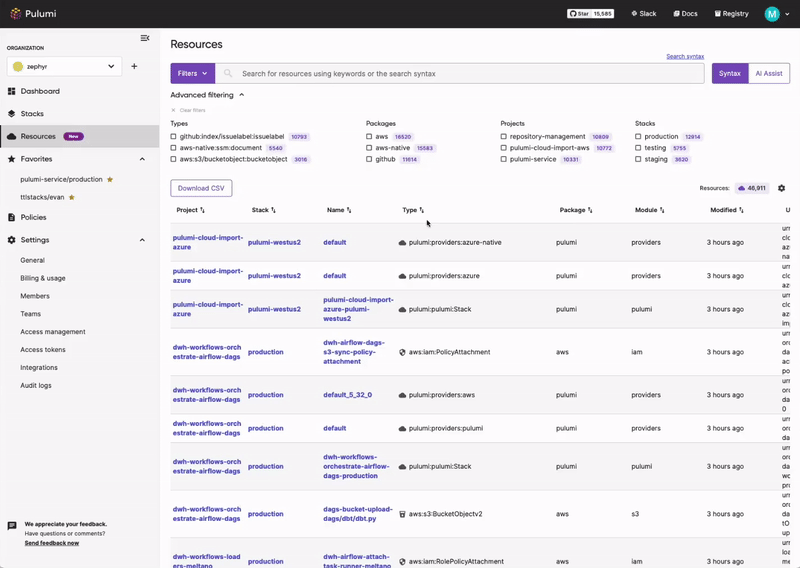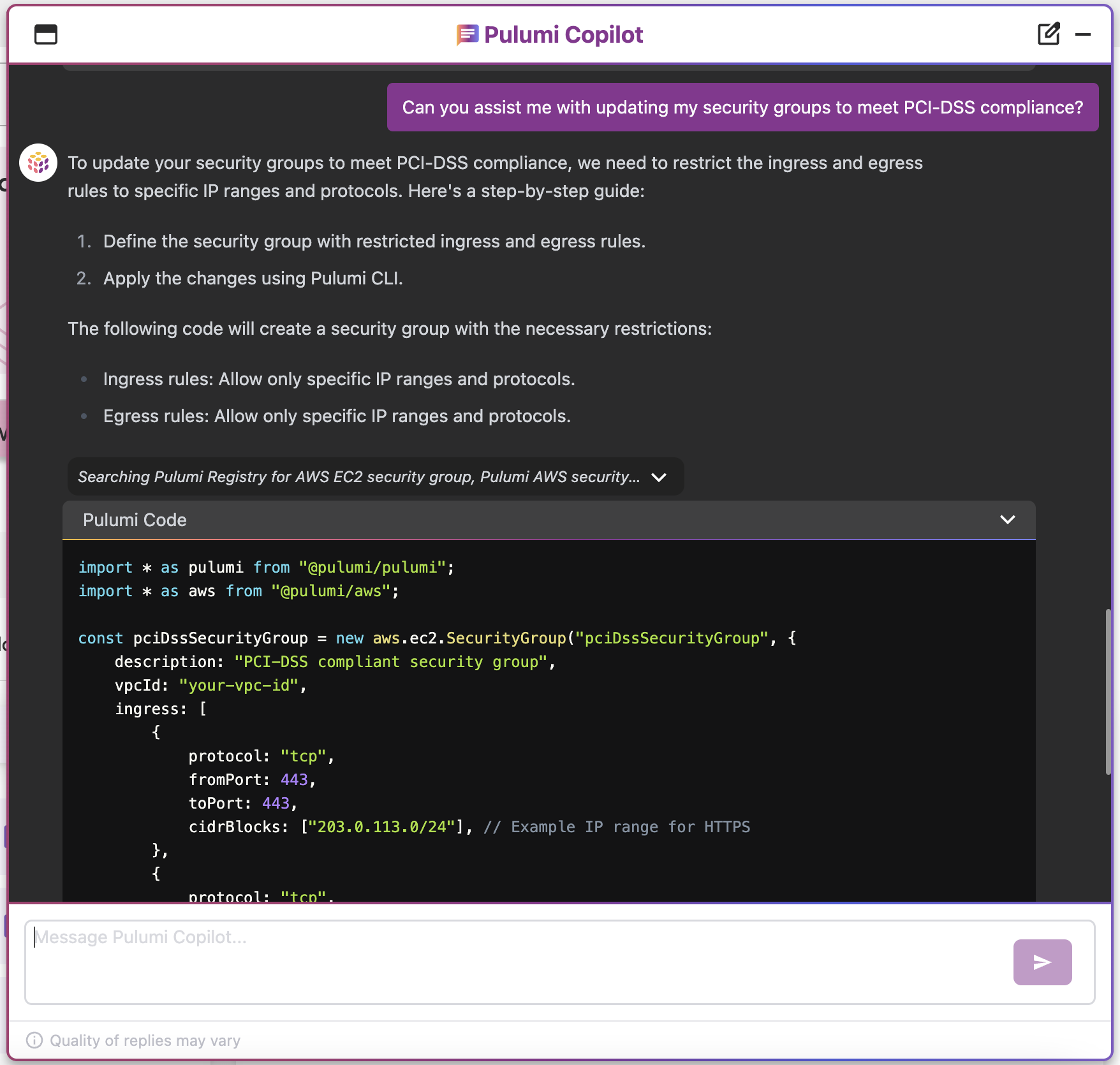How to Achieve PCI DSS Compliance for AWS RDS
How to Achieve PCI DSS Compliance for AWS RDS
PCI DSS compliance is critical to protecting cardholder data that is processed, stored, and transmitted. Pulumi can assist you with making your AWS infrastructure PCI DSS compliant. Pulumi can help you identify existing cloud resources that are not in compliance, and it can also enforce compliance policies proactively before infrastructure is deployed. Get started with Pulumi to use these compliance tools or speak with a Solutions Architect to get an expert consultation.
What is PCI DSS Compliance?
PCI DSS (Payment Card Industry Data Security Standard) compliance refers to the adherence to a set of security standards designed to protect card information during and after a financial transaction. These standards are established by the Payment Card Industry Security Standards Council (PCI SSC), which was founded by major credit card companies like Visa, MasterCard, American Express, Discover, and JCB.
Key Aspects of PCI DSS Compliance
- Security Controls: Organizations must implement specific technical and operational security measures to safeguard cardholder data. This includes requirements like installing firewalls, encrypting cardholder data, and using antivirus software.
- Access Control: Only authorized personnel should have access to cardholder data. This involves setting up strong access control measures, such as unique user IDs and restricting physical access to sensitive data.
- Monitoring and Testing: Regularly monitor and test networks to ensure that security controls are functioning correctly and to identify vulnerabilities. This includes maintaining logs of all access to network resources and cardholder data.
- Information Security Policy: Organizations must maintain a policy that addresses information security for employees and contractors. This includes regular security awareness training.
- Regular Audits: Organizations that process, store, or transmit credit card information must undergo regular audits to ensure they are in compliance with PCI DSS requirements. This can involve self-assessment or external assessments, depending on the size of the organization and the volume of transactions processed.
Pulumi Insights
Use Pulumi Insights to gain visibility into your cloud infrastructure's configuration to assess PCI DSS compliance. Pulumi Insights is Intelligent Cloud Management. It helps you gain security, compliance, and cost insights into the entirety of your organization's cloud assets and automatically remediate issues.

Pulumi Copilot
Use Pulumi Copilot to assist configuring your infrastructure to make it compliance ready. You can tap into the Pulumi Copilot's deep understanding of your organization's context to gain visibility into the configuration of resources and assess their compliance.

Compliance Ready Policies
With comprehensive coverage of AWS, Pulumi Compliance Ready Policies provide an enhanced level of control and governance over your cloud resources. Pulumi Compliance Ready Policies empower you to enforce best practices, security standards, cost controls, and compliance requirements seamlessly within your infrastructure-as-code workflows.
What is RDS resources?
Amazon RDS (Relational Database Service) is a managed service that simplifies setting up, operating, and scaling relational databases in the cloud. It supports multiple database engines and automates tasks like backups, patching, and monitoring.
What controls can I put in place to evaluate RDS resources resources?
- RDS snapshot should be private
- RDS DB Instances should prohibit public access, as determined by the PubliclyAccessible AWS Configuration
- RDS DB instances should have encryption at-rest enabled
- RDS cluster snapshots and database snapshots should be encrypted at rest
- RDS DB instances should be configured with multiple Availability Zones
- Enhanced monitoring should be configured for RDS DB instances
- RDS clusters should have deletion protection enabled
- RDS DB instances should have deletion protection enabled
- RDS DB instances should publish logs to CloudWatch Logs
- IAM authentication should be configured for RDS instances
- RDS instances should have automatic backups enabled
- IAM authentication should be configured for RDS clusters
- RDS automatic minor version upgrades should be enabled
- Amazon Aurora clusters should have backtracking enabled
- RDS DB clusters should be configured for multiple Availability Zones
- RDS DB clusters should be configured to copy tags to snapshots
- RDS DB instances should be configured to copy tags to snapshots
- RDS instances should be deployed in a VPC
- Existing RDS event notification subscriptions should be configured for critical cluster events
- Existing RDS event notification subscriptions should be configured for critical database instance events
- An RDS event notifications subscription should be configured for critical database parameter group events
- An RDS event notifications subscription should be configured for critical database security group events
- RDS instances should not use a database engine default port
- RDS Database clusters should use a custom administrator username
- RDS database instances should use a custom administrator username
- RDS DB instances should be protected by a backup plan
- RDS DB clusters should be encrypted at rest
- RDS DB clusters should be tagged
- RDS DB cluster snapshots should be tagged
- RDS DB instances should be tagged
- RDS DB security groups should be tagged
- RDS DB snapshots should be tagged
- RDS DB subnet groups should be tagged
- Aurora MySQL DB clusters should publish audit logs to CloudWatch Logs
- RDS DB clusters should have automatic minor version upgrade enabled
Speak to a Solutions Architect to implement policy as code to manage RDS resources for PCI DSS compliance.
Talk to a Solutions Architect
Get in touch with our Solutions Architects to get all your resources in use with Pulumi Insights